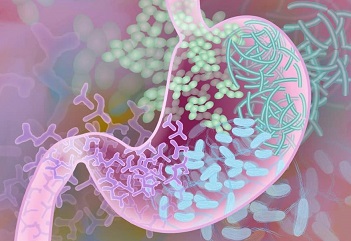The Intriguing Link Between Xanthines And Immune Cell Differentiation In The Gut
Thailand Medical - Xanthine - Th17 - Gut Health May 17, 2023 2 years, 9 months, 6 days, 22 hours, 34 minutes ago
The vast universe of microbes residing within the human gut plays a pivotal role in health and disease. This intricate microbial community influences various physiological processes, including immune function. The exact mechanisms linking gut microbes to immune activation and subsequent disease onset, particularly inflammatory disorders like Inflammatory Bowel Disease (IBD), are yet to be fully elucidated.

A groundbreaking study by researchers from Brigham and Women's Hospital, part of the Mass General Brigham healthcare system, has unveiled intriguing new insights about these mechanisms. The scientists delved into the factors that initiate the differentiation of T-helper 17 (Th17) cells in the gut, a vital type of immune cell.
While illuminating the steps leading to Th17 cell differentiation, the study team unexpectedly discovered a role for xanthine in the gut. This discovery, brings a fresh perspective to the understanding of gut health and inflammatory conditions.
The research subsequently shifted focus to the role of a previously overlooked compound, xanthine, a purine metabolite found in caffeine-rich foods like coffee, tea, and chocolate in gut health.
Xanthines, including xanthine, are a group of alkaloids found in most human tissues and fluids. They are known for their mild stimulant effects and their role in treating conditions like asthma and flu symptoms. Xanthine, a product of purine degradation, is also a precursor to uric acid.
Co-lead author Dr Jinzhi Duan from the Division of Gastroenterology, Hepatology, and Endoscopy at Brigham and Women's Hospital told
Thailand Medical News, “The role of microbes in triggering Th17 cell differentiation has been a longstanding concept in immunology. However, our study implies that there might be exceptions. The research highlighted the crucial part played by xanthine in this process, a finding that was as unexpected as it was exciting.”
Senior author Dr Richard Blumberg emphasized the serendipitous nature of this discovery. While the implications of xanthine concentrations in our daily cup of coffee or hot chocolate on gut health remain speculative, this finding opens a new avenue for investigating strategies to bolster the gut's protective barrier.
Th17 cells serve a dual role in the gut. On the one hand, they fortify the protective barrier and respond to bacterial or fungal infections. Conversely, they have been implicated in various autoimmune diseases, including IBD, multiple sclerosis, rheumatoid arthritis, and psoriasis.
In a series of experiments involving mouse models, the study team found that Th17 cells could proliferate even in germ-free mice or mice treated with antibiotics to eliminate bacteria. The team discovered that endoplasmic reticulum stress in intestinal epithelial cells triggered Th17 cell differentiation via purine metabolites like xanthine. This happened even in mice devoid of microbes, suggesting that Th17 cells might have protective properties.
However, the study does not identify what triggers Th17 cells to become pathogenic, i.e., involved in disease progression. Moreover, the influence of cellular interactions between the gut and other organs on outcomes is not yet known. Despite these limitations, the study paves the way for fu
rther exploration of these mechanisms in human IBD-associated Th17 cells.
The study findings were published in the peer reviewed journal: Immunity.
https://www.cell.com/immunity/fulltext/S1074-7613(23)00092-4
The key highlights of the study findings were that:
-Endoplasmic Reticulum (ER) stress in intestinal epithelial cells (IEC) drives gut Th17 differentiation
-Th17 cells induced by IEC-ER stress require H2O2 generated by DUOX2/DUOXA2
-IEC-ROS induce Th17 differentiation through purine metabolites, including xanthine
-IEC-ER stress drives microbial Th17 induction even under germ-free conditions
The study team summarized the study as follows, “Intestinal IL-17-producing T helper (Th17) cells are dependent on adherent microbes in the gut for their development. However, how microbial adherence to intestinal epithelial cells (IECs) promotes Th17 cell differentiation remains enigmatic. In our study, we found that Th17 cell-inducing gut bacteria generated an unfolded protein response (UPR) in IECs. Furthermore, subtilase cytotoxin expression or genetic removal of X-box binding protein 1 (Xbp1) in IECs caused a UPR and increased Th17 cells, even in antibiotic-treated or germ-free conditions. Mechanistically, UPR activation in IECs enhanced their production of both reactive oxygen species (ROS) and purine metabolites. Treating mice with N-acetyl-cysteine or allopurinol to reduce ROS production and xanthine, respectively, decreased Th17 cells that were associated with an elevated UPR. Th17-related genes also correlated with ER stress and the UPR in humans with inflammatory bowel disease. Overall, we identify a mechanism of intestinal Th17 cell differentiation that emerges from an IEC-associated UPR.”
With the newfound understanding of the role of Xanthine in Th17 cell differentiation, this humble compound emerges as a compelling subject for future research in the realm of gut health.
For the latest developments in the field of Gastroenterology, keep on logging to
Thailand Medical News.
